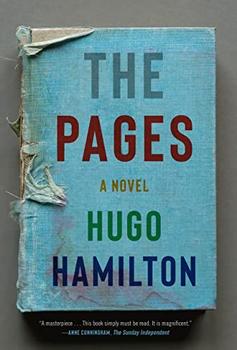Summary | Excerpt | Reviews | Beyond the Book | Readalikes | Genres & Themes | Author Bio

A novel
by Hugo Hamilton
Her father was German, but he didn't speak the language to her. He was a baker from East Germany who arrived in the United States after the Berlin Wall came down and, denied his mother tongue, didn't want to be known as German. His eyebrows were often covered in flour. He came home from work with white eyelashes. And white floury hands that gave him the appearance of a ghost, alive and moving, his inner being left behind in a country that no longer existed. Her parents became uncoupled when she was around twelve. Her mother went back to live in Ireland and Lena stayed with her father in a two-room apartment in a suburb of Philadelphia that smelled of yeast. Where I was kept in a bookcase by the door, unread, unborrowed, until I was handed over to Lena one evening when her father was dying of cancer. In a slow voice that held on to the accent of a lost country, he made her promise to take care of me.
Look after this book like a little brother, he said.
Is the past more childish than the present? Does history need to be kept safe like part of the family?
I have been defaced a little. Some annotations were written into the margins by my original owner, a Jewish professor of German literature at the Humboldt University in Berlin. His name was David Glückstein. He drew a map on a blank page at the back. It's more like a diagram—half map, half illustration. No specific location given. It shows a bridge crossing a stream. A path with an oak tree and a bench underneath. There is a forest to one side of the path and some farm buildings on the other. The shadows cast by the farm buildings have been sketched in as though you'd have to arrive there at the same time of day to recognize the place. It's a private memory, drawn to remember a day on which the professor stood in the company of the woman he loved, and buried something precious under a sundial to keep it from falling into the wrong hands.
Needless to say, the map has nothing to do with me. It's not part of the original publication. The sole purpose of a book is to live another day and tell the story ascribed to it by the author. In my case, the story of a man with a barrel organ who is down on his luck.
It could be said that I am lucky to be alive. On the night of the fire in Berlin, with a large crowd of spectators gathered on the opera house square to watch books being burned to death, I somehow managed to escape. While all those human stories were being disfigured by the flames and dispatched as smoke and charred remnants into the night sky above the State Library, the professor looked into the future and handed me over to a young student for safekeeping. The student was Lena Knecht's grandfather. He kept me hidden inside his coat. That's how I was rescued and passed down through the family into Lena's possession, why she is now on a flight back to Berlin to find out where that map leads to.
Excerpted from The Pages by Hugo Hamilton. Copyright © 2022 by Hugo Hamilton. All rights reserved. No part of this excerpt may be reproduced or reprinted without permission in writing from the publisher.
Your guide toexceptional books
BookBrowse seeks out and recommends the best in contemporary fiction and nonfiction—books that not only engage and entertain but also deepen our understanding of ourselves and the world around us.